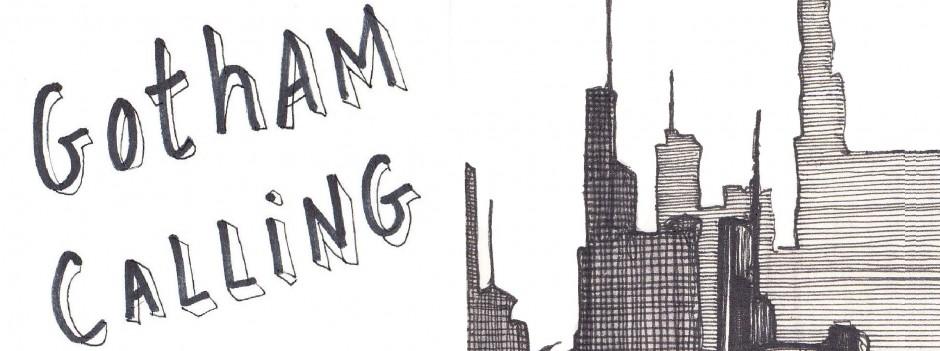It’s Gotham Calling’s ninth anniversary!
This past year was especially irregular in terms of posting because I had more classes than usual, but I’ve finally found a way to turn this in the blog’s favor. One of my courses looked at how popular culture imagined the Cold War as it unfolded, so I spent much of the year watching, rewatching, discussing, and thinking about films from that era… And so, since I like to celebrate Gotham Calling’s landmarks with longer listicles or compilations, this time I’m providing a selection of 120 movies made both during and about the Cold War.
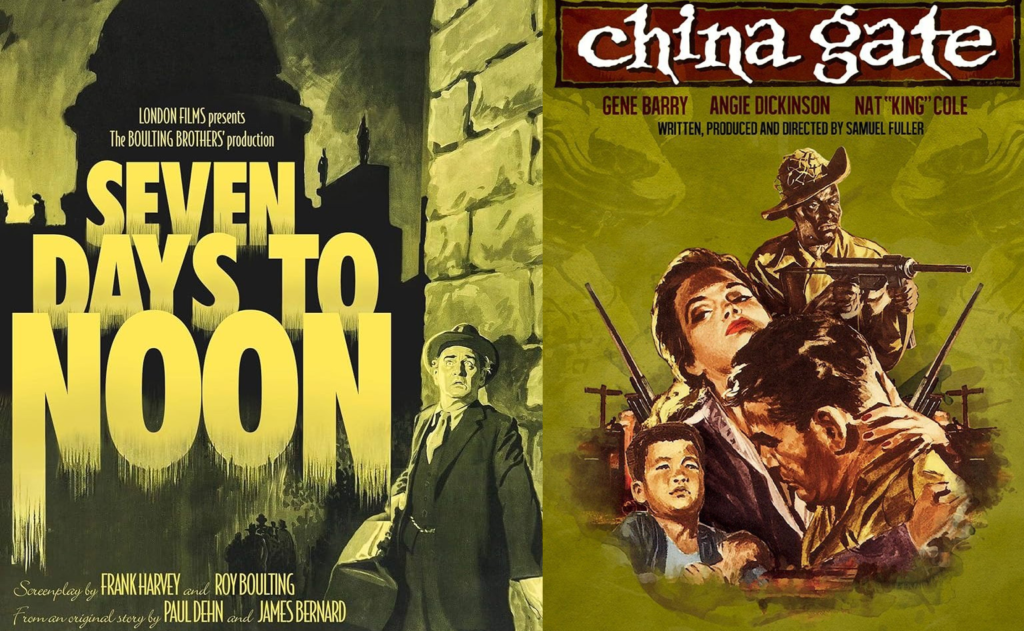
I’m working on a longer project about this but, for now, I’ll just share a preliminary list (spread over twelve biweekly posts). It is hardly exhaustive or balanced: there is way more West than East and most productions are from the United States and Europe despite the fact that the Cold War affected culture all over the globe…
In other words, many key episodes and features of the Cold War are missing, as are plenty of ‘iconic’ movies that I don’t find as appealing as the ones below. Still, if you binge-watch all of the ones I selected, especially in chronological order, you’re bound to get quite an immersive – and, I hope, occasionally surprising – experience and come out of it with a wider understanding of how the Cold War was visualized at the time.

As for the selection criteria, the main thing was whether I found a film both genuinely entertaining and interesting in terms of what it suggests about the Cold War (i.e. propaganda is a feature, not a bug). My definition of the Cold War is quite broad, ranging from the arms race and proxy conflicts to the sheer competition between capitalist and socialist models of modernity.
That said, I had to limit the list somehow – so, while there are some allegories in there, I privileged films where the references to the conflict were relatively textual (and not just in the subtext). By themselves, archetypical metaphors and themes such as space exploration, alien invasions, secret government programmes, and brainwashing weren’t enough to automatically merit inclusion… although you will certainly find at least one instance of each of these elements on the list.

The end result is pretty eclectic, which suits the spirit of Gotham Calling. Some entries are stirring pieces of filmmaking and storytelling by themselves, others are fascinating specifically because of their production context. And while they’re all fiction, contrary to this blog’s primary focus not all of them fall into what is conventionally designated as ‘genre fiction.’ That category can sometimes be useful to quickly identify stories that are shamelessly formulaic and unpretentious (like Batman comics), but it can also prove limited and misleading… After all, let’s face it, classical dramas and comedies are themselves genres with their own formulas, traditions, subgenres (e.g., family drama, slapstick comedy…), and popular appeal.
In this case, I’m approaching Cold War cinema as a genre in itself, i.e. as a set of recurrent themes, tropes, and imagery that may draw common interest in all of these – otherwise quite varied – films.
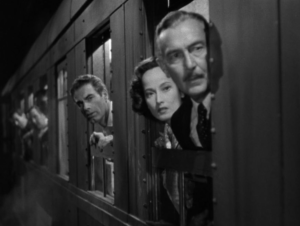
1. Berlin Express (USA, 1948)
Berlin Express is a very fun Hitchcock-like thriller, despite being depressingly set in bombed-out Germany, where a group of men – and a woman – from the USA, UK, France, and USSR come together… and the Cold War doesn’t yet seem inevitable. Like some of the movies below, it was filmed against the backdrop of actual German rubble, thus capturing the materiality of the place at that moment in history, even while absorbing it into an unabashedly artificial narrative.
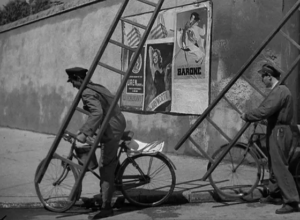
2. Bicycle Thieves (Italy, 1948)
If you want to get a sense of the reasoning for the Marshall Plan and for the United States’ interference in Italy’s 1948 elections (i.e. why Washington thought communism had a chance in Western Europe), there are worse places to look for it than in the neorealist classic Bicycle Thieves, whose depiction of Rome’s poverty-stricken lives stands in stark contrast to the escapist glamour of American cultural imperialism (as reflected in the street posters, which play a key role in the plot).
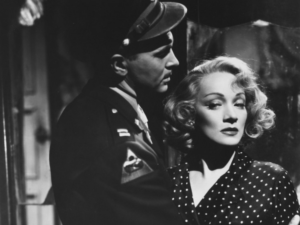
3. A Foreign Affair (USA, 1948)
An absolutely scathing satire of the Allied occupation of Germany. Hopping from political screwball comedy to romance to musical to social drama to noirish spy thriller and back again, A Foreign Affair embodies the abrasive energy with which, along with the military, Hollywood also traveled to war-torn Europe to rebuild its imaginary. (Although Italian neorealism powerfully filmed the same locations and similar situations in Germany Year Zero, its sombre approach to the literal and moral ruins of post-fascist Berlin strikes me as more contemplative of the past than of the future… and therefore less indicative of the looming Cold War compared to the ‘anything goes’ attitude of A Foreign Affair.)
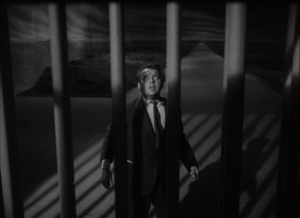
4. Krakatit (Czechoslovakia, 1948)
A nightmare on screen. Blending gothic horror with science fiction, Krakatit inaugurates the apocalyptic angst of the atomic arms race (even though it was made back when the United States still had a nuclear monopoly) through the bewildering saga of a man who discovers a powerful explosive and desperately tries to prevent its weaponization. The expressionistic lighting and unsettling camerawork, along with surrealist, steam-of-consciousness storytelling, deliberately emulate a feverish hallucination.
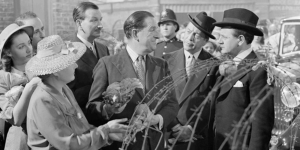
5. Passport to Pimlico (UK, 1949)
In Passport to Pimlico, a London area suddenly declares independence from the United Kingdom, leading to an original – and quite funny – take on postwar rationing, the Berlin airlift, and decolonization.
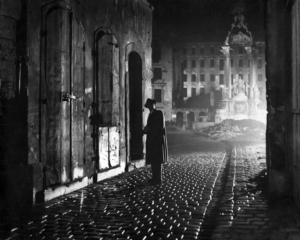
6. The Third Man (UK/USA, 1949)
The greatest film noir ever (as repeatedly stated at Gotham Calling), The Third Man is a mystery set – and shot – in occupied Austria, where, once again, the main tension is not so much between East and West as between the United States and Europe.
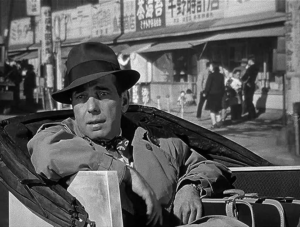
7. Tokyo Joe (USA, 1949)
In turn, Tokyo Joe tends to be remembered – when it’s remembered at all – as little more than a competent noiry crime drama (with a touch of Caniff-esque aerial adventure), albeit elevated by Humphrey Bogart’s world-weary charisma. From a Cold War perspective, though, this depiction of occupied Japan provides a remarkably neat counterpart to all those movies about postwar Europe, begging for a comparison of their plain similarities and sharp contrasts.
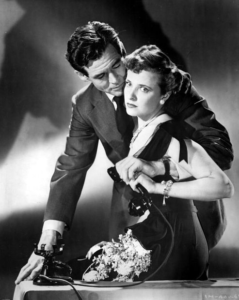
8. The Woman on Pier 13, aka I Married a Communist (USA, 1949)
If Tokyo Joe has been ignored, this home front noir has been utterly reviled. The tragic tale of a San Francisco shipping executive getting blackmailed by the US Communist Party (practically indistinguishable from an organized crime racket), The Woman on Pier 13 is often maligned – and mocked – as an epitome of hysterical Red Scare propaganda. While that’s not entirely unfair when it comes to the production’s spirit, interestingly the result is more ideologically jumbled (as compellingly argued by Robert Miklitsch). It’s also a pretty stylish affair, with plenty of hardboiled dialogue, white-knuckle action, and stunning chiaroscuro cinematography. (The corruption of dockworkers’ unions was soon to be the object of a much more – deservedly – acclaimed picture, On the Waterfront, but the anti-communism in that one is largely subtext, implicitly justifying director Elia Kazan’s decision to denounce fellow leftists to the House Un-American Activities Committee.)
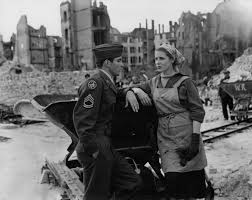
9. The Big Lift (USA, 1950)
The flip side of A Foreign Affair is this slickly crafted semi-documentary dramatizing the conflicted re-establishment of relations with (some) Germans: written during the Berlin Blockade and shot on location immediately afterwards, with the collaboration and supervision of the United States’ military, The Big Lift ostensibly presents a more benign view of the American forces (between this and 1948’s The Search, Montgomery Cliff started his film career as the friendly face of uniformed compassion for Europe…). Yet the final product is itself engagingly multi-layered, resorting to various clever and amusing strategies to convey – and even, to some extent, problematize – western discourse about this inaugural event of the Cold War.
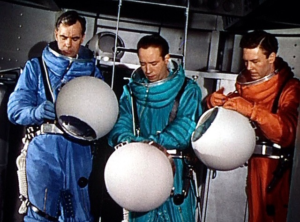
10. Destination Moon (USA, 1950)
Despite a few precedents, Destination Moon is the epic that truly kicked off the cinematic space race, anticipating future technology through hard science fiction while channelling the politics of its day in the form of jingoistic warnings against a foreign enemy, not to mention a staunch commitment to the superiority of corporate capitalism. What a time capsule!
